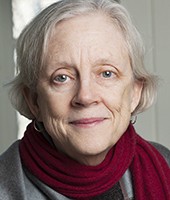Mary Baine Campbell
Mary Baine Campbell is Professor of English and Comparative Literature at Brandeis University, where she teaches medieval and early modern literature, and for some time directed the Creative Writing program. She is the author of The Witness and the Other World: European Travel Writing 400-1600, Wonder and Science: Imagining Worlds in Early Modern Europe (winner of the MLA's James Russell Lowell Prize for the Best Book of 2001), and two books of poetry: her current project is a book on early modern dreams. She has held research fellowships at Brown and Columbia Universities, the National Humanities Center (US), the Max Planck Institut fur Wissenschaftsgeschichte, and Birkbeck College, University of London.
Research interests:
Travel writing, utopia, history of science, cultures of knowledge, poetry as a form of knowledge, medieval and early modern history of dreams; more recently science fiction, cli-fi, and the relations of fiction and climate change.
Dreaming, Motion, Meaning: Oneirics in the Atlantic World, 1550-1750
My book takes as its starting point the dream as an imaginative and creative act performed in sleep: the creative activity a priori from which spring such phenomena as “narrative,” “fiction,” “metaphor” and, collaterally, poetry. In Europe before the Reformation it was persistently, if not universally, respected as a source of knowledge of the future. Dream reports are found among the earliest traces of writing, but in the developed modern world dreams have been privatized, persisting mainly sub rosa. This work of combined literary and cultural history, novel in its approach to dreams, will focus on the transitional period of early modern dream and its suppression in the Atlantic world (especially France, England, and the New World), by the end of which the dream has lost its epistemological and social prestige. Henceforth it is a diagnostic tool for physicians, then nothing at all: Débrun does not mention it in his foundational 1789 Cours de Psychologie. The practice is constitutively associated by the late 17th century with superstition, witchcraft, and nomadic societies in the New World. Why, and what were the consequences for the connected practices and histories of writing and of colonialism? The early modern is a dynamic period for the study of dreams, as a phenomenon relatively stable over millennia in bearing and value was challenged by major transformations in belief and social experience. French medicine, philosophy and literature are at the heart of them.
|
Lecture by M. B. Campbell, 2017-2018 Paris IAS fellow Talk by M. B. Campbell, 2017-2018 Paris IAS fellow Mary Baine Campbell presents her research project within the framework of the weekly internal seminar |
|
|
|
|



